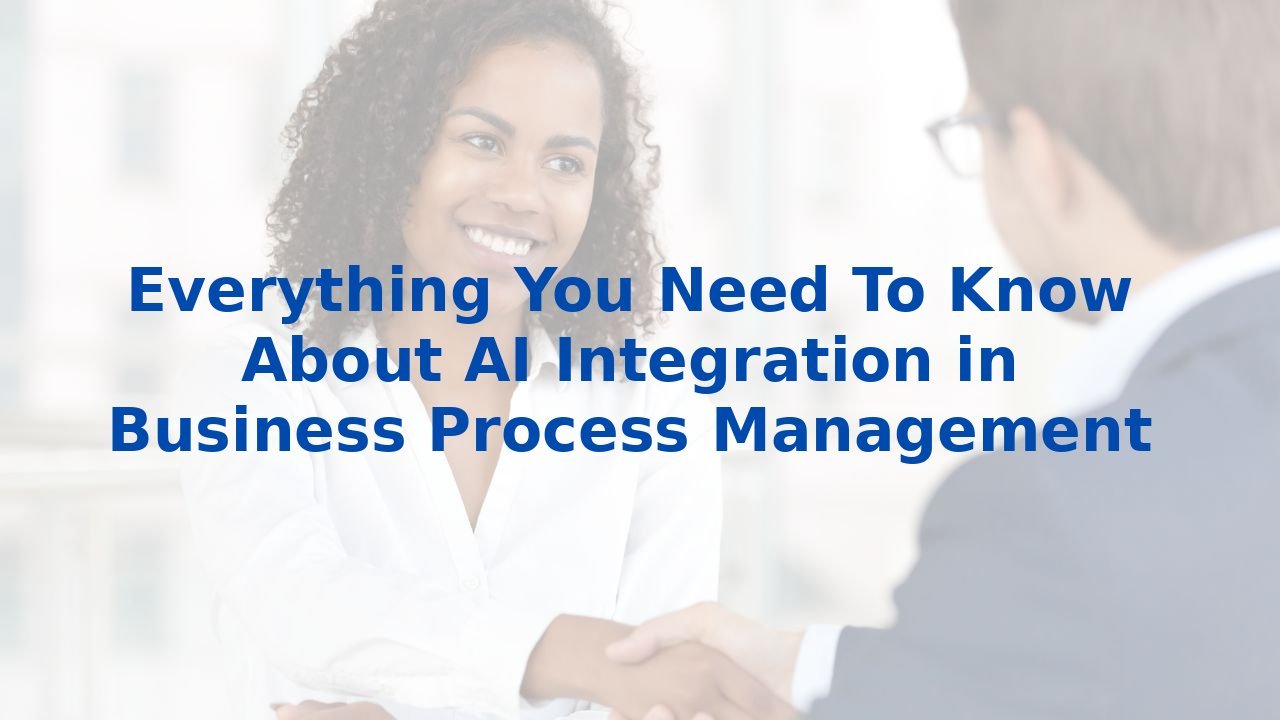Everything You Need To Know About AI Integration in Business Process Management
Everything You Need To Know About AI Integration in Business Process Management
In today’s rapidly evolving business landscape, organizations are continually seeking new pathways to enhance operational efficiency and maintain a competitive edge. One of the most transformative advancements in this pursuit is the integration of Artificial Intelligence (AI) into Business Process Management (BPM). Let’s explore how AI is reshaping business processes, provides newfound efficiencies, and elevates overall performance within organizations.
Process Discovery: Unveiling Hidden Efficiencies
AI-driven process discovery acts as a beacon in identifying inefficiencies obscured within organizational operations. Traditional methods often rely on employee interviews and manual data assessments, which can be time-consuming and subjective. In contrast, AI rapidly analyzes vast amounts of operational data to reveal patterns, workflows, and relationships that might elude human observation. This process mining technology equips businesses with vital insights into where bottlenecks exist, enabling them to fine-tune their operational models for enhanced effectiveness.
Process Mapping: Creating a Blueprint for Success
Once the discovery phase is complete, AI shifts gear to process mapping. By translating crucial insights into visual workflows, AI employs machine learning and data analytics to outline how processes interconnect and pinpoint where inefficiencies lead to bottlenecks. This ensures not just clarity but contemplates changes within the organization, keeping documentation current and actionable, while facilitating continuous improvement.
Process Automation: The Workhorse of Efficiency
Process automation represents one of the most tangible applications of AI within BPM. Robotic Process Automation (RPA) integrated with AI takes over mundane, repetitive tasks that previously consumed hours of valuable human labor. From handling data entry tasks to managing customer service inquiries, AI-driven tools can operate ceaselessly, achieving remarkable levels of accuracy. The result? A significant boost in efficiency, allowing human employees to pivot their focus to strategic and creative initiatives that truly drive organizational growth.
Enhancing Customer Service and Meetings
AI’s capabilities extend beyond analytics and automation into realms like customer service and meeting management. Imagine AI tools that autonomously handle administrative tasks, from scheduling appointments to summarizing meeting notes. These innovations liberate valuable time for personnel to concentrate on what they do best—building relationships and strategizing. In customer service, AI excels in assessing interaction quality, ensuring standards are met and delivering consistently positive experiences to customers.
Boosting Sales and Marketing
In sales and marketing, AI analytics integrated within CRM systems yield invaluable insights that inform decision-making. Through predictive analytics, AI can identify high-potential customers and those at risk of churn, guiding sales efforts towards fruitful engagements. Chatbots, powered by AI, provide instant support and efficiently resolve customer queries, enhancing overall engagement and driving revenue growth in the process.
Revolutionizing Product Development
AI is also making waves in product development, augmenting creativity through generative design technologies. Designers can input requirements, and the AI explores myriad design possibilities that meet those specifications. This innovation reduces the time and resources spent on generating prototypes, fostering a rapid development cycle that brings ideas to fruition with unprecedented speed.
Optimizing Human Resources
The transformative impact of AI extends into Human Resources (HR), where it cultivates a more objective and enhanced employee experience. AI can expedite recruitment processes by conducting preliminary assessments, thereby minimizing the reliance on lengthy interview cycles. By analyzing performance metrics and market trends, AI empowers managers to craft competitive offers while maintaining fairness. Automating tedious HR tasks not only heightens efficiency but also allows organizations to invest more time in nurturing their workforce.
The Importance of Employee Training for AI Integration
While the potential of AI is immense, it dramatically hinges on the human factor. Training your workforce to effectively harness AI empowers employees with the necessary skills to interpret insights and navigate new technologies with ease. This investment fuels adaptability and leads to a smoother transition to AI-enhanced workflows—ultimately enhancing productivity and fortifying competitive positioning within the market. Organizations that prioritize educating their teams will see seamless integration, maximizing the returns on their AI strategies.
Conclusion
The integration of AI into Business Process Management is nothing short of transformative. From process discovery and mapping to automation and predictive analytics, AI is redefining how organizations operate, significantly boosting efficiency and effectiveness. As we advance, businesses must not only adopt these technologies but also invest in employee training to unlock AI’s true potential. In doing so, organizations pave the way for streamlined processes, reduce operational errors, and empower their teams to make more informed strategic decisions—ensuring long-term success in an increasingly dynamic market.
To further explore how to integrate AI seamlessly into your organization, consider looking into training programs that equip your workforce with the necessary skills and knowledge.



